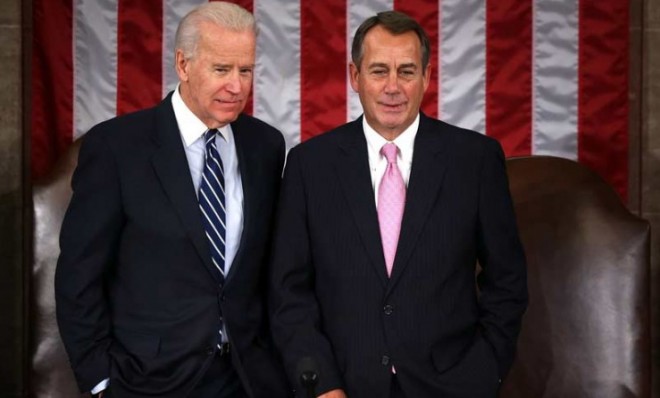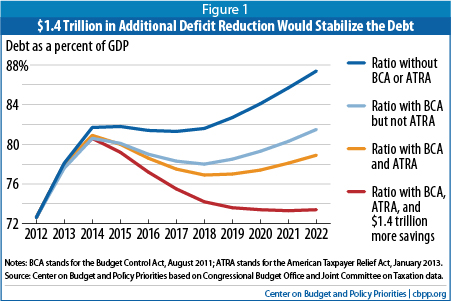How Congress can solve the U.S. budget crisis: Do nothing?
While apparently nobody was looking, says a fiscal think tank, Washington basically solved our budget problem


It almost seems hard to believe now, but a mere dozen years ago Washington was arguing over how best to handle the nation's budget surplus. That didn't last long, of course, and the last two years have seen protracted battles and absurd brinksmanship over how we're going to solve our terrible budget deficit. Well, good news, says Richard Kogan at the Center on Budget and Policy Priorities (CBPP), a Washington think tank: Thanks to the recent fiscal cliff deal (ATRA) and the 2011 Budget Control Act (BCA), we're only about $1.4 trillion away from putting our fiscal house in acceptable order:

Those two laws have already cut our 10-year deficit by $2.4 trillion, apparently while nobody was looking, and according to Kogan's analysis, cutting another $1.4 trillion by 2022 would stabilize our debt-to-GDP ratio at 73 percent, says Suzy Khimm at The Washington Post. That wouldn't solve all our fiscal problems, but the CBPP believes a 73 percent debt-GDP ratio "will be enough to ward off the potential negative consequences of excessive debt: Crowding out domestic investment and prompting international credit markets to turn against the United States."
And hey, $1.4 trillion over 10 years "is really not a huge amount of money," says Kevin Drum at Mother Jones. "If we split this equally between spending cuts and tax increases, we need about $600 billion of each," or $60 billion a year, with the other $200 billion coming from interest savings. Even our polarized Congress can manage that. Or, says Khimm, Congress could solve our fiscal problems by doing... nothing.
The Week
Escape your echo chamber. Get the facts behind the news, plus analysis from multiple perspectives.

Sign up for The Week's Free Newsletters
From our morning news briefing to a weekly Good News Newsletter, get the best of The Week delivered directly to your inbox.
From our morning news briefing to a weekly Good News Newsletter, get the best of The Week delivered directly to your inbox.
The CBPP's baseline doesn't assume that the rest of the sequester will take effect or that Congress will have paid for a Medicare doc fix. So if Congress either let the $1.2 trillion sequester happen or replaced it with equal amount of deficit reduction, it would need just $200 billion more in deficit reduction to achieve the CBPP's target.... Either way, legislators wouldn't have to do that much more than solve the sequester — or just do nothing and let the rest of the sequester take effect — to reduce the deficit to the CBPP's satisfactions. [Washington Post]
So, viva la gridlock? Maybe not. "Hawkish critics will argue that a 73 percent debt-to-GDP ratio is too high," says Khimm. The IMF and EU set an optimal target of 60 percent, for example. And "deficit owls believe that such targets (or any targets at all) for deficit reduction are arbitrary and end up hampering growth through austerity." Well, it's true that "the painless and most effective solution to the deficit is additional growth in GDP," says Walter Hickey at Business Insider. But cutting or taxing our way to a stable rate of debt increase would put the U.S. "in an exceptional position moving forward."
What a bunch of wet blankets, says Paul Krugman at The New York Times. The big takeaway from this report "is surely that for the next decade, the debt outlook actually doesn't look all that bad."
True, there are projected problems further down the road, mainly because of the continuing effects of an aging population. But it still comes as something of a shock to realize that at this point reasonable projections do not, repeat, do not, show anything resembling the runaway deficit crisis that is a staple of almost everything you hear, including supposedly objective news reporting. So you heard it here first: While you weren't looking, and the deficit scolds were doing their scolding, the deficit problem (such as it was) was being mostly solved. Can we now start talking about unemployment? [New York Times]
A free daily email with the biggest news stories of the day – and the best features from TheWeek.com
Peter has worked as a news and culture writer and editor at The Week since the site's launch in 2008. He covers politics, world affairs, religion and cultural currents. His journalism career began as a copy editor at a financial newswire and has included editorial positions at The New York Times Magazine, Facts on File, and Oregon State University.
-
 The Week contest: How now, smart cow?
The Week contest: How now, smart cow?Puzzles and Quizzes
-
 The UK’s supposed Christian revival
The UK’s supposed Christian revivalThe Explainer Research has shown that claims of increased church attendance, particularly among young people, ‘may be misleading’
-
 How long can Keir Starmer last as Labour leader?
How long can Keir Starmer last as Labour leader?Today's Big Question Pathway to a coup ‘still unclear’ even as potential challengers begin manoeuvring into position
-
 The billionaires’ wealth tax: a catastrophe for California?
The billionaires’ wealth tax: a catastrophe for California?Talking Point Peter Thiel and Larry Page preparing to change state residency
-
 Bari Weiss’ ‘60 Minutes’ scandal is about more than one report
Bari Weiss’ ‘60 Minutes’ scandal is about more than one reportIN THE SPOTLIGHT By blocking an approved segment on a controversial prison holding US deportees in El Salvador, the editor-in-chief of CBS News has become the main story
-
 Has Zohran Mamdani shown the Democrats how to win again?
Has Zohran Mamdani shown the Democrats how to win again?Today’s Big Question New York City mayoral election touted as victory for left-wing populists but moderate centrist wins elsewhere present more complex path for Democratic Party
-
 Millions turn out for anti-Trump ‘No Kings’ rallies
Millions turn out for anti-Trump ‘No Kings’ ralliesSpeed Read An estimated 7 million people participated, 2 million more than at the first ‘No Kings’ protest in June
-
 Ghislaine Maxwell: angling for a Trump pardon
Ghislaine Maxwell: angling for a Trump pardonTalking Point Convicted sex trafficker's testimony could shed new light on president's links to Jeffrey Epstein
-
 The last words and final moments of 40 presidents
The last words and final moments of 40 presidentsThe Explainer Some are eloquent quotes worthy of the holders of the highest office in the nation, and others... aren't
-
 The JFK files: the truth at last?
The JFK files: the truth at last?In The Spotlight More than 64,000 previously classified documents relating the 1963 assassination of John F. Kennedy have been released by the Trump administration
-
 'Seriously, not literally': how should the world take Donald Trump?
'Seriously, not literally': how should the world take Donald Trump?Today's big question White House rhetoric and reality look likely to become increasingly blurred
